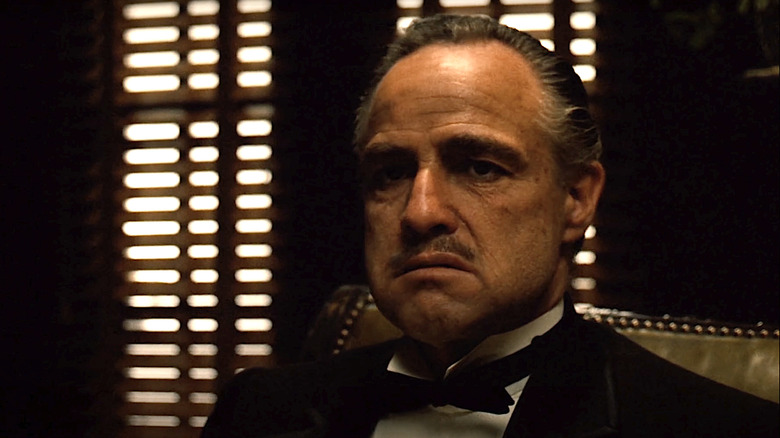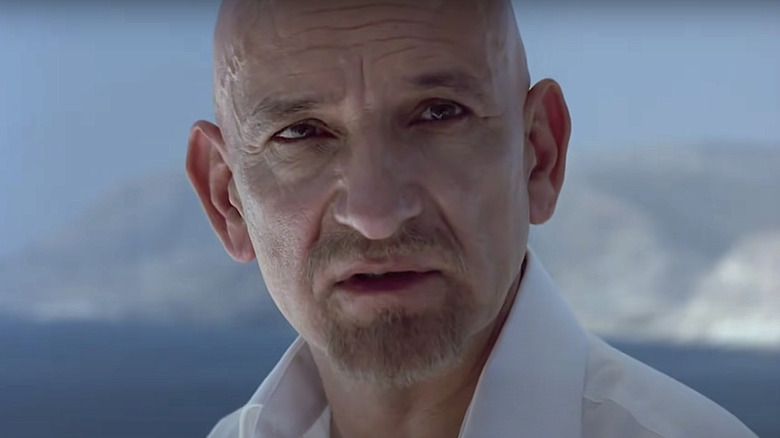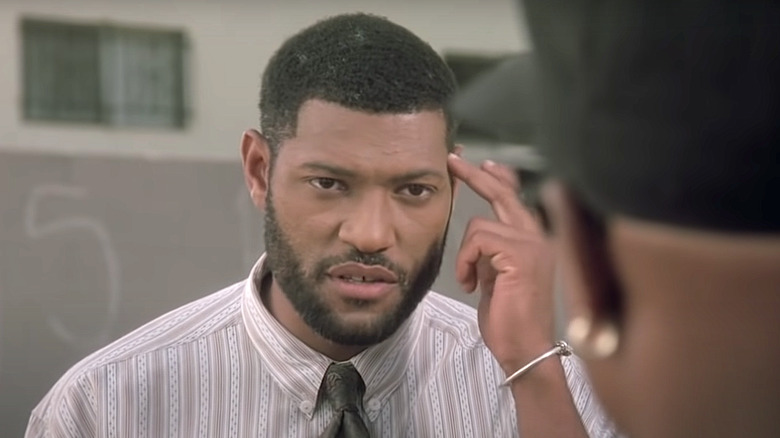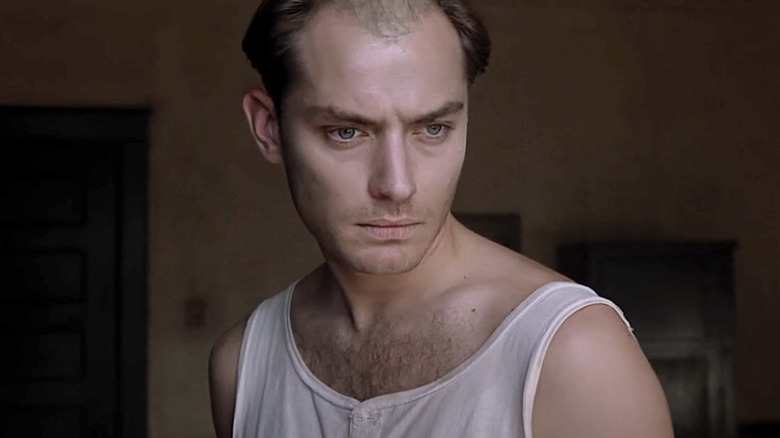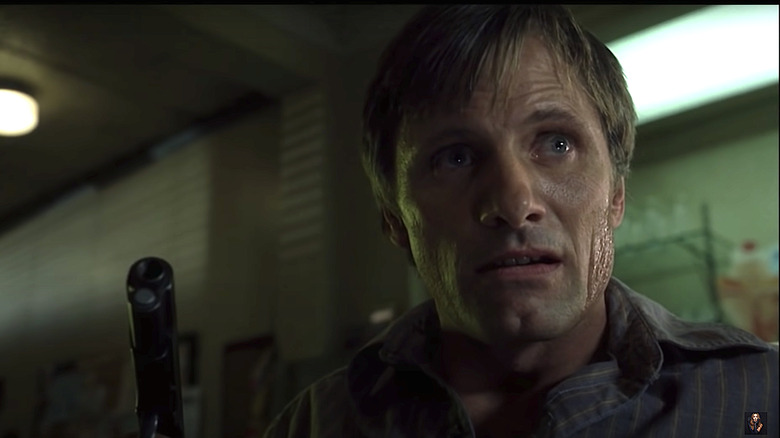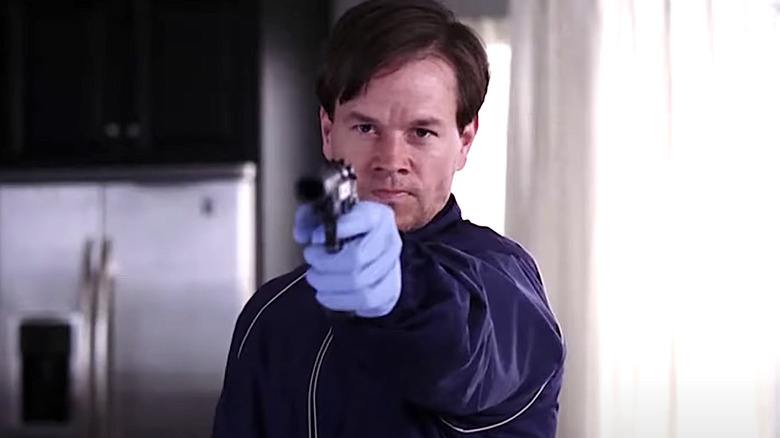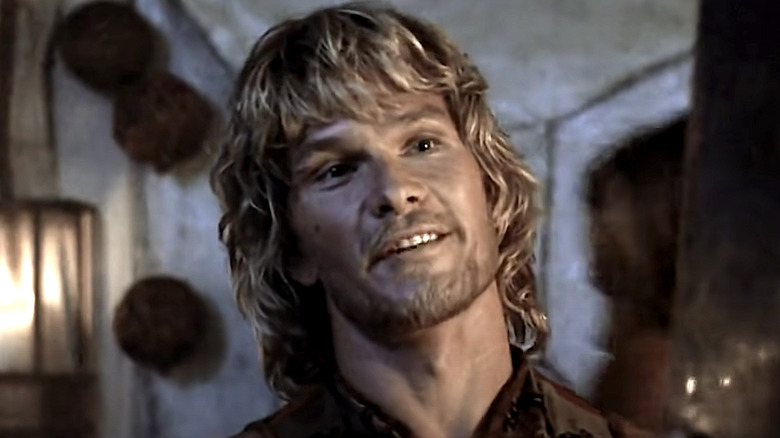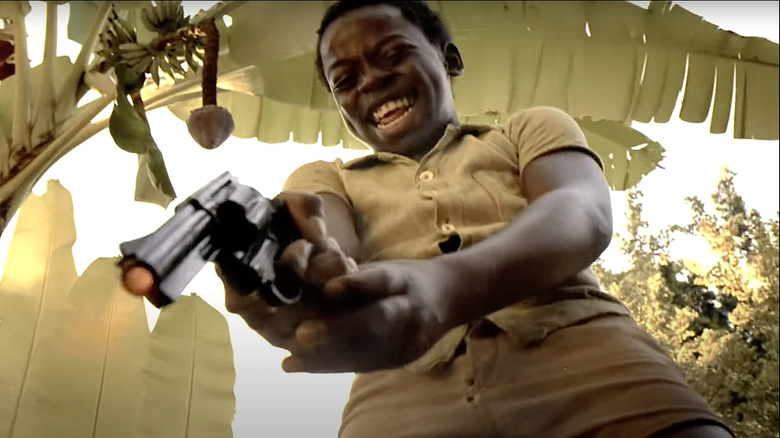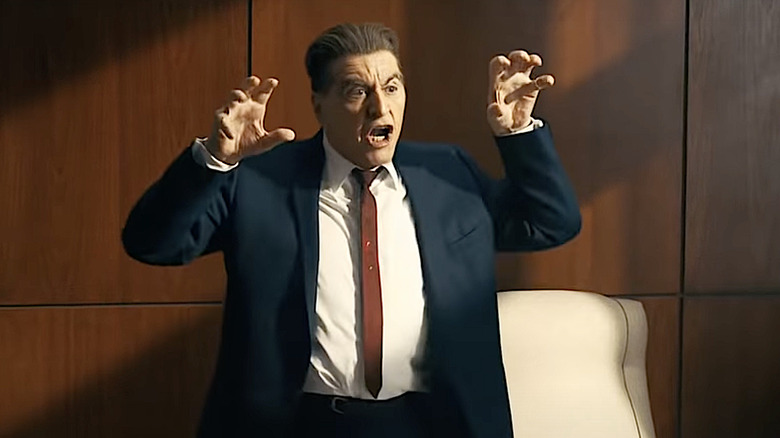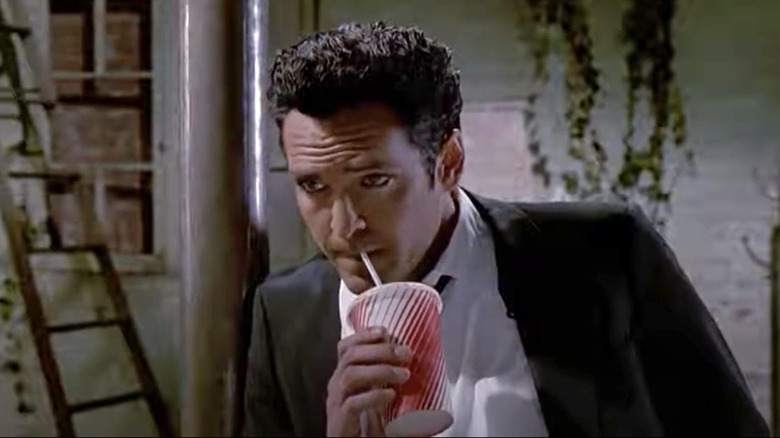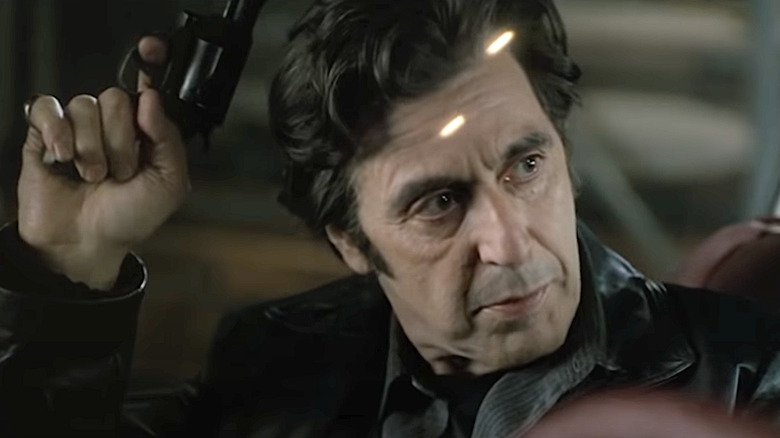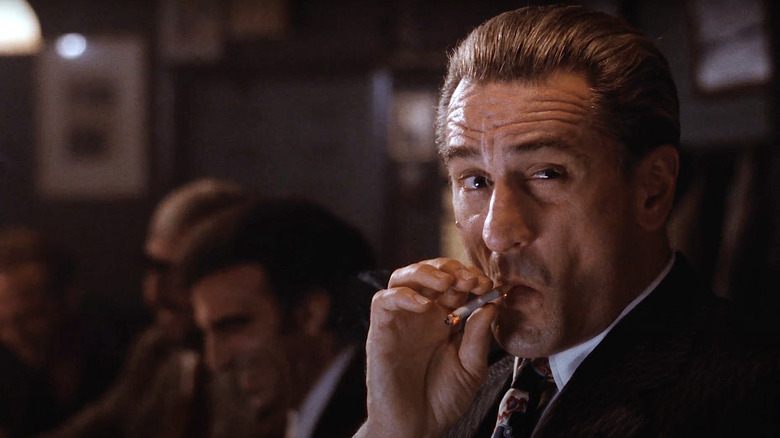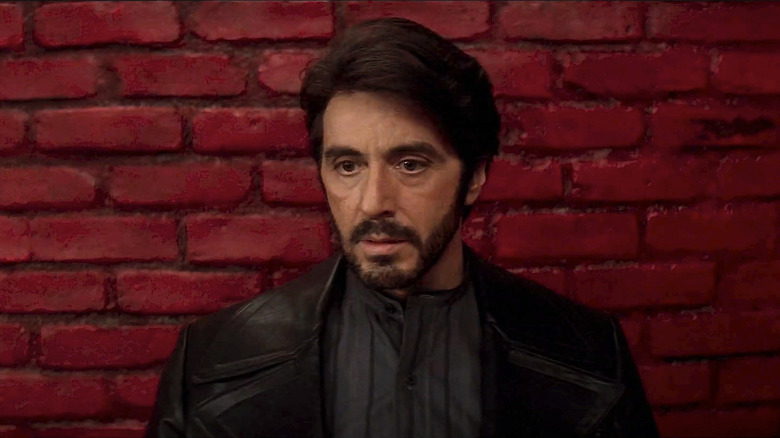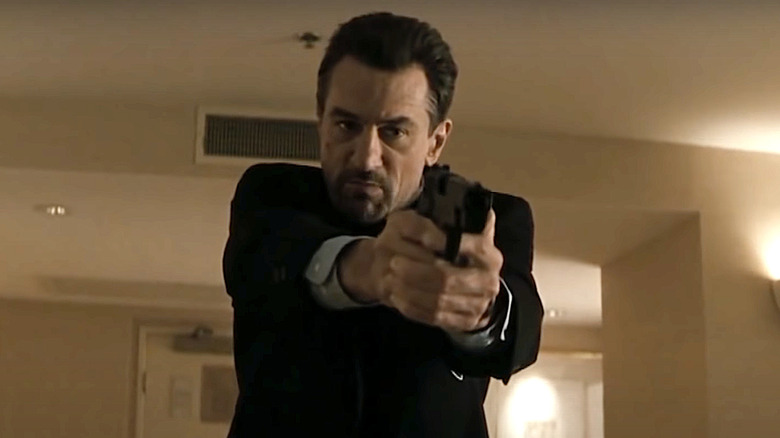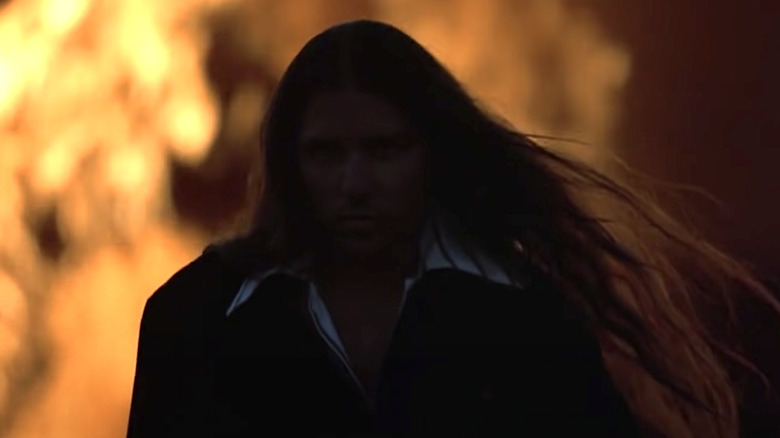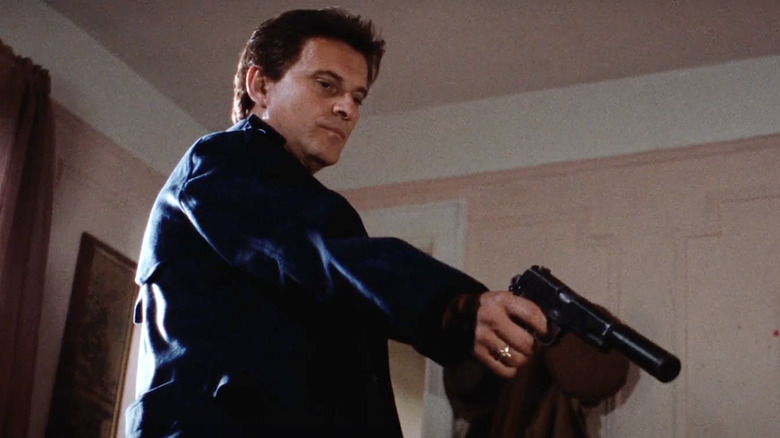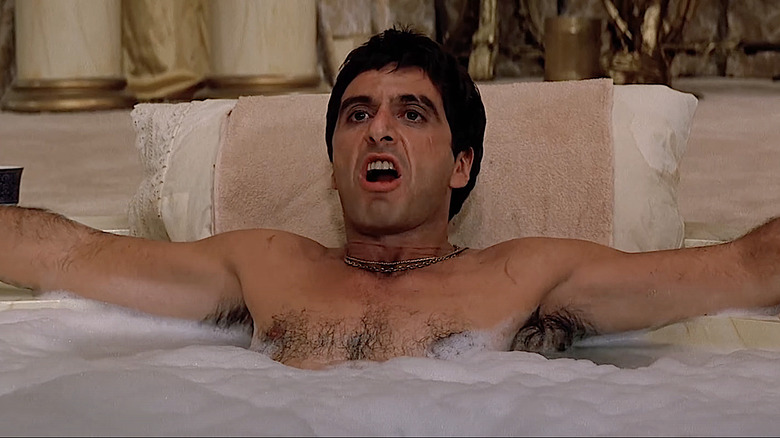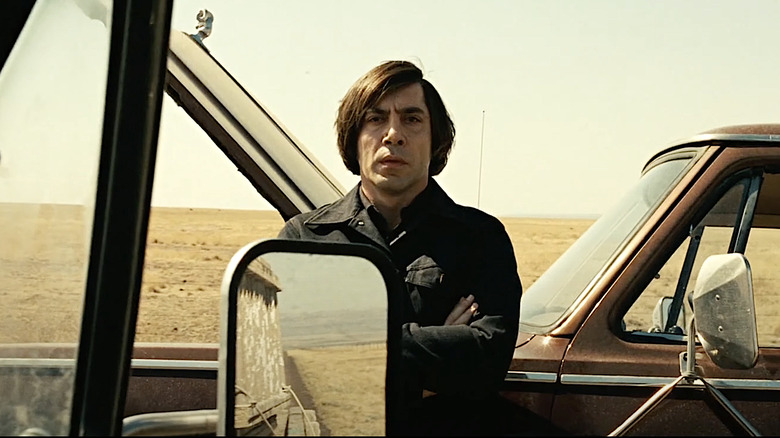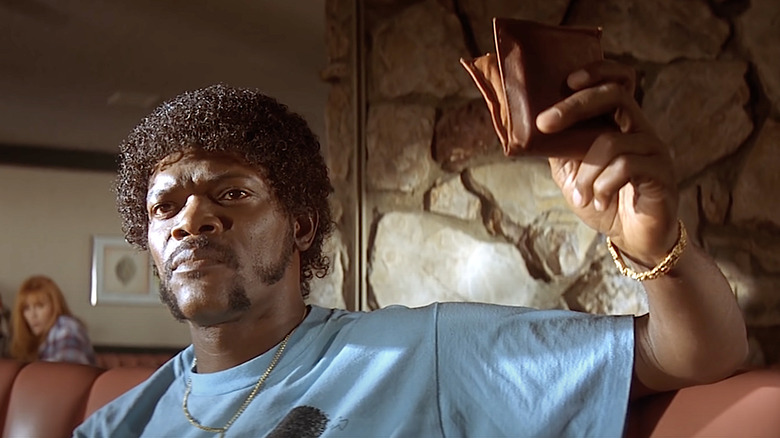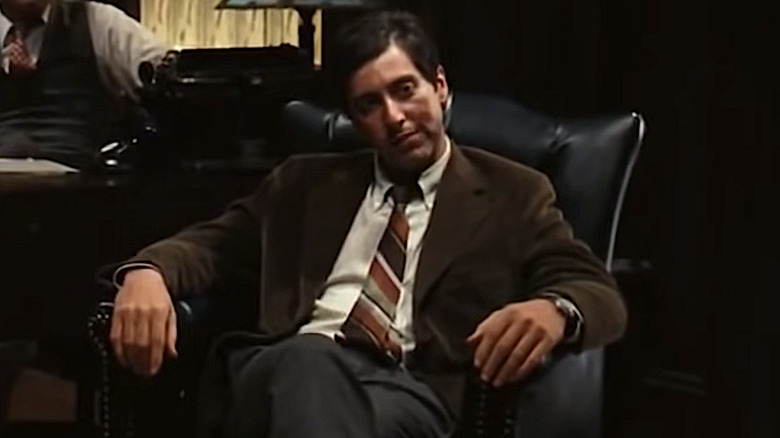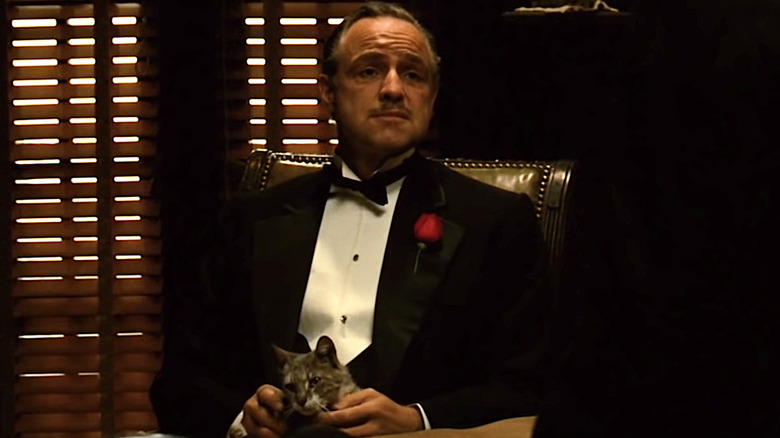The 20 Best Gangster Movie Characters Ranked
Gangster movies date back to at least 1912 with D.W. Griffith's "The Musketeers of Pig Alley." The genre really took shape in the 1930s with movies such as "Little Caesar" and "The Public Enemy" (both from 1931) about ruthless Chicago outlaws. James Cagney's turn in 1938's "Angels with Dirty Faces" is another seminal entry.
These early gangster flicks are must-sees for film buffs but don't make this particular list. Cagney's mannered delivery is iconic, but the period style of these classic films makes them tough to recommend in earnest to busy people with limited recreational screen time.
Marlon Brando's performance in "On The Waterfront" in 1954 was a revolution in naturalistic style that brought us closer to modern filmmaking and deserves an honorable mention, but here, we're ranking those organized outlaws that resonate most in pop culture to this day and that will likely be available to stream. That canon started going strong in the 1970s with Francis Ford Coppola's peerless "The Godfather" and peaked stylistically in 1990 with "Goodfellas," though many of the greatest films in the genre are even newer. Here are the best gangster movie characters ranked.
20. Don Logan — Sexy Beast
Ben Kingsley is a scary man. Whether his character's motives are opaque like in "Shutter Island," or he's playing a polite version of himself in "The Sopranos," the clean-shaven thespian is villainy personified. "Sexy Beast," released in 2000, was very much a late-career revival for Kingsley, as the industry was reminded of this terrifying force of nature in their midst.
Don Logan is like a machine-gun-mouthed version of Tommy DeVito from "Goodfellas." He's always one hair-trigger tantrum from murder — a compulsive bully and venomous gaslighter who wants to be crossed.
Logan's stated objective is the heist scheme he brings to a semi-retired criminal associate (Ray Winstone) who wants nothing more than to get tan and bloated in retirement. What Logan really wants is total war. Logan is more like a demon in need of an exorcism than a mobster. He is the most seething, unhinged big-screen button-man yet.
19. Jason 'Furious' Styles — Boyz n the Hood
Gangster movies aren't known for their solid father figures. Sure, there are plenty of dads around, but is the Machiavellian Michael Corleone setting the best example as his kids dodge bullets?
Jason "Furious" Styles (Laurence Fishburne) from writer-director John Singleton's 1991 classic, "Boyz n the Hood," breaks the mold. He strives to unite a community fractured by drugs and gang violence against the external forces he sees as the real enemy. Us-versus-them is his deep-voiced pitch for peace to neighborhood toughs. "You're doing exactly what they want you to do," he says firmly to a local banger, "You've got to think, brother, about your future."
Despite his ideals, Furious has no control over his neighborhood's fate. Where his ideas are more grounded is where he's king: in his own home — a palace he protects with a large caliber pistol. When his son, Tre Styles (Cuba Gooding Jr.), grabs the gun to avenge the film's central tragedy, Furious dissuades him from continuing the cycle of vengeance. Furious saves his son from the fate of so many of his peers — not with violent heroics but with the righteous legitimacy of his fatherly rule.
18. Harlen Maguire — Road To Perdition
Harlen Maguire was our first glimpse of the exceptional work Jude Law was capable of when he grew tired of playing handsome but purely metaphorical lady killers.
Director Sam Mendes' sophomore effort after "American Beauty" is the heartfelt 2002 gangster noir "Road to Perdition" with the grandfatherly Paul Newman as the Irish mob's crime boss. Newman was in his late 70s and the story needed a more robust and physical villain. Law would follow this film with "Cold Mountain," and "Alfie," so he was dead center in his pretty-boy prime. However, he utterly transforms into the graphic novel's filthy depression-era hitman Harlen Maguire.
Maguire is a crime scene photographer, shooting dead bodies by day and creating them by night. Mendes is rumored to have wanted Law to take on a rodent-like appearance. He's balding, gaunt, and pale with teeth rotting. The grit under his fingernails is always in view as Law gracefully rolls a coin over his knuckles. It's a subtle detail that speaks to this killer's patience and dexterity. Maguire is tasked with killing a mob enforcer on the run played by Tom Hanks. When the actors first face-off over diner food and coffee it's De Niro-Pacino in "Heat" level stuff. Maguire is truly the last freelance hitman you'd ever want hot on your trail.
17. Tom Stall — A History Of Violence
Alfred Hitchcock was known to get bored on set because he'd already composed the film in his imagination. "A History of Violence" director David Cronenberg is famous for the opposite approach. He often figures out his shots on the spot.
Cronenberg's improvised style mirrors the reality of violence. In the real world, the director suggests, violence can't be planned out or even avoided. And if it's coming for you, it's best to have a hidden past full of carnage.
Viggo Mortensen plays small-town family man Tom Stall. His life is turned upside down when a gangster shows up, claiming Tom is a brutal mobster in hiding. The film is adapted from a pulpy graphic novel so, of course, we find Stall is secretly a creative savant of brutality. But it's not because he's evil. Not exactly. He's like Clint Eastwood's William Money in "Unforgiven." For Tom, violence barely seems to raise his pulse. As others panic, Tom executes — literally. He's a mild-mannered gangster whose temperament once gave him the will to walk away but also never let him lose the improvisational spontaneity of those old killer instincts.
16. Sergeant Dignam — The Departed
"The Departed" is a gangster film in which law enforcement itself feels like a disjointed array of rival gangs. Jack Nicholson's kingpin trafficker, Frank Costello, is playing all sides, and the fact that Boston Police is divided between regular cops, elite undercover cops, and corrupt internal affairs officers make it all the easier. Add Costello's role as an FBI informant and getting away with murder is easy.
Mark Wahlberg's profane Sergeant Dignam is a good cop furious at these precarious internal divisions. He nearly comes to blows with another honest detective played by Leonardo DiCaprio. Life on the force has taught Dignam to trust no one so he has almost as much contempt for his undercover assets as he does for the mobsters he's chasing.
Wahlberg channeled his hardscrabble youth in Dorchester for the role. He was the youngest of nine, dealing drugs and addicted to cocaine by age 13. At age 16, he was convicted of a violent robbery assault against an Asian man. Wahlberg's victim eventually forgave him and even asked for the repentant actor to be pardoned in 2014. Martin Scorsese's only film about the Irish mob has a real sense of place, and Wahlberg's Dignam is the authentic, seething, scenery-chewing anchor.
15. Bohdi — Point Break
Sure, Kathryn Bigelow's action classic, "Point Break," is more of a heist flick, but don't let Bohdi's (Patrick Swayze) surfer-dude pretenses fool you. He's just as much of a gangster as depression-era gunmen like John Dillinger, and his modus operandi is the same.
Like many thieves, Bohdi's drug of choice is adrenaline. The skydiving, the big-wave surfing, and the bank jobs are all just thrills. He and his gang of long-haired heshers might think they're just stealing to finance some zen pursuit of endless summer, but that's all self-deception.
Bohdi dresses up his gangster nihilism in stoner philosophizing. "It was never about money for us. It was about us against the system. That system that kills the human spirit. We stand for something to those dead souls inching along the freeways in their metal coffins."
In reality, he's got more in common with Henry Hill from "Goodfellas," who says of the working class, "They had no balls. If we wanted something, we just took it." Michael Cheritto from "Heat" was more honest about this while contemplating one last score: "For me, the action is the juice." And that's the ground truth. Bodhi is a great gangster not because he's different but because he's just like the rest, just with a "radical" new arsenal of excuses.
14. Li'l Dice — City of God
Like Nicky Santoro in "Casino," Li'l Dice (Douglas Silva) is a frightening figure partly because he is so small. When all it takes to end a life is the pull of a trigger, the most dangerous gangsters are the ones with the least compunction to take a life.
Li'l Dice doesn't rule over the slums of Rio in 2002's "City of God" with ingenious plots but with a sheer will to kill. Every scene with Dice is an anxious guessing game as to whether someone will die. His origin story shows a pre-teen Dice robbing hotel patrons. He then guns down his victims, and just for kicks, some kitchen staff too. He does it all with a sickening grin of delight.
Dice (later anointed Li'l Z in a smoky cemetery ritual) loves crime, but murder is his real racket, and business is booming in a city where life has so little value. His power as a gangster is his willingness to do what others won't. He's the kind of mobster who makes other criminals afraid. Gangsters like Dice live by whim not reason, and the biggest mistake their enemies can make is waiting around to negotiate.
13. Jimmy Hoffa — The Irishman
"The Irishman" is too long! Or so bemoaned critics of the greatest ever straight-to-streaming gangster movie. Martin Scorsese's three-and-a-half-hour epic about an Irish mob hitman who befriends and ultimately betrays Jimmy Hoffa is certainly long-winded, but it's also incredibly watchable given the director's exquisite eye for the workaday details of gangster life. The film is so hypnotic that it is among the movies Netflix subscribers have spent the most time enjoying.
Scorsese's camera isn't as fluid in "The Irishman" as it is in his earlier mob masterpieces like "Goodfellas." That's because the director wanted to get the old band back together, casting a nearly 80-year-old Al Pacino as Hoffa. That meant shooting with a cumbersome camera rig designed to aid the post-production de-aging of the film's long-in-the-tooth cast.
The reported $175 million "The Irishman" budget peeled off big bucks to make Robert De Niro look young enough to be a WWII soldier — only to have a Youtuber do better with free software he found online. Pacino even needed coaching on how to get out of a chair like a younger man. Yet it all works because Hoffa's essence is old-dog intractability, even as Mafia killers warn him to keep his ego in check. Hoffa laps up ice cream and fumes as his union powers wane while Scorsese brilliantly caps his canon of mob movies about men with fatal cases of macho pride.
12. Mr. Blonde — Reservoir Dogs
"Are you gonna bark all day, little doggy, or are you gonna bite?" That's Mr. Blonde's (Michael Madsen) casual response to an enraged fellow gangster (Harvey Keitel) as he casually sips a soft drink. Blonde had just blown their heist to hell by indiscriminately opening fire, but he still made time to stop for a snack. Like Waingro from "Heat," he's the archetypal gangster character who is incapable of professionalism.
In the early 1990s, nobody was cooler than Michael Madsen. Quentin Tarantino knew this, so when he came up with a scene in which one of his gangsters carves up a cop to the smooth '70s sounds of Stealers Wheel's "Stuck in the Middle with You" only one actor could make it work.
"We weren't married to nine to five guys," Henry Hill's wife, Karen, observes of the mobster mentality in "Goodfellas." Some of the scariest gangsters can barely abide by mob norms, let alone live as law-abiding citizens. Mr. Blonde is that classic gangster foil who doesn't care about the plan. He's purely a sadist who will always have a gas can at the ready so he can watch it all burn.
11. Benjamin 'Lefty' Ruggiero — Donnie Brasco
Director Mike Newell is a standup studio guy. He even directed a Harry Potter movie in 2005. However, Newell hit a gangster home run in 1997 with "Donnie Brasco" by cribbing Martin Scorsese's theme of the working-class desperation that lies beneath the supposed glamour of Mafia membership.
Al Pacino, the king of mob-movie actors, does it again by ditching the grandiosity of Michael Corleone for a character role as Benjamin "Lefty" Ruggiero. Lefty is a degenerate gambler and hitman who has given his life to become a "made" man. He lives in a dingy apartment and grinds out thankless work weeks just to finance the "vig" he owes to his loan-sharking Mafia betters. That's how he becomes a figure of pity for Johnny Depp's undercover FBI agent, Joe Pistone, who posing as a mob-adjacent jeweler named Donnie Brasco.
Donnie first gains Lefty's trust by spotting the mobster's "fugazi" diamond. It's a fake with no value. That's the truth this tragic gangster can never see. The Mafia is a pyramid scheme, and Lefty is at the miserable bottom. He knows he's got nothing to show for his deal with the devil yet won't let Donnie utter a word against the twisted honor code that stole his life and keeps him impoverished. Crime bosses may have penthouses and pink Cadillacs. Meanwhile, "wiseguys" like Lefty take foolish pride in never paying for a drink — even as they're the ones picking up the real tab.
10. Jimmy Conway — Goodfellas
Martin Scorsese's endlessly ballyhooed "Goodfellas" is the gangster movie in which the mask of Mafia glamor slips. When we first meet dapper thief Jimmy "the Gent" Conway (Robert De Niro), it's in the New York of the mobbed-up 1950s. Classic cars line the streets in neighborhoods where kids run errands for gangsters who operate in the open. In this world, Conway is a happy warrior, tipping the truck drivers he robs just as he does his bartender "for keeping the ice cold."
Scorsese's pictures are about decline, though, and by the late 1970s, the FBI is closing in and the cracks in Jimmy's facade are starting to show. As Cream's "Sunshine of your Love" blares, the camera pushes in on De Niro standing at a bar. He takes a drag of a cigarette, hangs his mouth open, and then squints one eye in that often-satirized way. And that's it. That's the scene. Jimmy says nothing, but we know he's decided to whack everybody — friends included.
Jimmy isn't always menacing like his unhinged associate, Tommy DeVito (Joe Pesci). He's a real gangster. He'll cordially hire you for a heist and then get Tommy to shoot you in the back and steal your cut, too. Jimmy Conway is the ruthless embodiment of Henry Hill's summation of mob friendships: "See, your murderers come with smiles, they come as your friends, the people who've cared for you all of your life."
9. Carlito Brigante — Carlito's Way
Director Brian De Palma has been both praised and derided as a Hitchcock imitator. In "Carlito's Way," De Palma shunts aside the master of suspense to channel his friend and contemporary Martin Scorsese for a first-person mob opera about a gangster who just can't escape "the life."
Al Pacino plays Carlito Brigante. When his crooked lawyer (Sean Penn with a truly suspicious perm) gets this former drug trafficker released from prison, Carlito is desperate to go straight, put together a bankroll, and sail into the sunset. But as he re-integrates into his colorfully rendered Puerto Rican neighborhood in East Harlem, Carlito's vicious reputation precedes him. "The streets are watching," Pacino rasps. Carlito is among the gangster genre's most tragic figures because he's no villain. Despite his "old reflexes kicking in," he passionately loves a good woman and even spares the life of a miserable psychopath named Benny Blanco, who wants to both be Carlito and kill him. Carlito's fatal flaw is his loyalty to his crooked friends.
In the documentary "De Palma," the director declares, "I can't make a better picture than this." He's partly referring to this film's masterful neo-noir style, but Pacino's performance as Carlito is this story's enduring power. Carlito Brigante is the only great movie gangster you can root for with a clean conscience.
8. Neil McCauley — Heat
Robert De Niro's heist maestro, Neil McCauley in "Heat," might not be mobbed-up exactly, but he's certainly a gangster. He calls his band of crafty crooks a "crew," but let's be real, they're a gang and some of the most organized criminals ever depicted on film.
Broadly, there are two types of anti-hero gangsters. Some vaguely want to go straight, but others, like McCauley, are driven by the fantasy of one last score. "I do what I do best. I take scores. You do what you do best — try to stop guys like me," an unrepentant Neil tells Al Pacino's detective Vincent Hannah.
McCauley cuts a classic gangster figure. His oversized, double-breasted suits could work in any mobster era back to prohibition when gangsters really dressed up for work. McCauley radiates cool and decisiveness around his highest purpose: "I am never going back." To prison, he means, warning Hannah he'll first choose death. But his total commitment and expertise can't make up for a street-vengeance mentality that still has him hooked. McCauley is as slick as gangsters get, but the genre is broadly tragic, and even the best-laid plans can't overcome an anti-hero's original sin.
7. Keyser Söze — The Usual Suspects
The twist ending in "The Usual Suspects" is so good it was a meme before memes were a thing. Roger Ebert wrote in his 1999 review of the similarly twisty "Fight Club" that movies just don't measure up anymore without that big reveal finale, a phenomenon he dubbed, "the Keyser Söze syndrome."
Söze is more than a cool plot gimmick. As this mythic gangster's alter ego, Verbal Kint (Kevin Spacey) explains of the crime lord's legend among underworld types, "I believe in God, and the only thing that scares me is Keyser Söze."
Söze is the only figure on this list who is both unmercifully murderous and Machiavellian enough to do his own PR in plain sight. Maybe he is a Hungarian drug czar who killed his own family to make a point, or perhaps that's just another myth from this gangland master of personal branding. Ultimately, Keyser Söze's supreme power is deception.
6. Tommy DeVito, Nicky Santoro — Goodfellas, Casino
Yes, Joe Pesci basically plays the same hair-trigger psychopath in both "Goodfellas' and "Casino." The Martin Scorsese mob movie canon bends towards injustice and towards itself.
Tommy and Nicky are the Mafia's unchecked id. Scorsese's leads, like Ray Liotta's Henry Hill and Robert De Niro's Sam "Ace" Rothstein, are gangsters that unravel while working under the illusion of self-control. Pesci's characters have no such compunction. The impulsivity of these psychopaths is what makes them feel so real and what makes them such compelling agents of chaos.
Pesci's diminutive size is another key. Other films, like "City of God," put their villain in similarly small packages. Real-world violence doesn't spring from physical presence but from personalities with no emergency brake. When someone makes you furious why not mete out vengeance? Socrates would have said there's a little "daemon" on your shoulder. Tommy and Nicky have no such guardians. Pesci is also one of the most charismatic actors on Earth. "You're a funny guy," an intermittently frightened and amused Henry says of Tommy in "Goodfellas." Pesci's iconic enforcers ooze cartoonish charm, and their unpredictability is what makes them so scary and unforgettable.
5. Tony Montana — Scarface
Paul Muni was the first to play immigrant gangster Tony Camonte in the original 1932 "Scarface, but it was Brian de Palma and Al Pacino who took the character to the graphic novel levels of absurdity that have made the character so indelible. Rechristened with the surname "Montana" (after legendary San Francisco 49ers quarterback Joe Montana) and conceived as a Cuban immigrant rather than Italian, the Tony of De Palma's 1983 "Scarface" remake is an invention of screenwriter Oliver Stone.
Nowhere was this character's cult status more clear than on MTV's long-running celebrity show-off series "Cribs" where a comically high percentage of successful stars would proudly produce their framed "Scarface" posters. Pacino's Montana is the gangster genre's most unhinged alpha male, and his uncompromising "the world is mine" psychopathy has made him the central idol of modern gangster worship.
Stone also infused this character with personal details. Tony's manic appetite for cocaine came from the writer-director's own drug experiences. Robert De Niro was originally slated to play Tony, and as great as that would've been, Pacino going full Pacino is really what sets the character off. The final shootout as Tony introduces everyone to his "little friend" is so over-the-top that Pacino burned his hand on the hot barrel of one of the (real) prop guns and couldn't film for two weeks. Tony Montana might have been intended as a coked-up cautionary tale, but just like Stone's Gordon Gekko from "Wall Street," the cultural effect was the creation of a masculine icon of ruthless ambition that has never been topped.
4. Anton Chigurh — No Country For Old Men
"No Country For Old Men" is adapted from Cormac McCarthy's novel of the same name. The author's sparse but enigmatic prose paints a haunting portrait of the wild West as an end-times metaphor, and his villains, like Anton Chigurh, are fittingly supernatural.
In McCarthy's other celebrated work, "Blood Meridian," a similarly preternatural villain named Judge Holden relentlessly pursues the cowboy heroes. Holden is a semi-historical, scalp-collecting killer, but McCarthy's vision is of a lettered warrior-philosopher in the body of a monstrous demigod of doom.
In the Coen Brothers' Oscar-winning 2007 McCarthy adaptation, "No Country For Old Men," the writer's vividly detailed Chigurh (Javier Bardem) has a more earthbound assassin's craft. His captive bolt stunner, normally used for slaughtering livestock, is a chilling detail and incredibly useful for breaching doors — and human skulls. But even if Chigurh is slightly less deified, what he represents is the same. He is a relentless killing force and a heartless philosopher-king who can only puzzle as his victims fruitlessly barter for their lives. He may be a hired cartel hitman, but Chigurh answers only to the coin in his pocket and the inescapable fate it represents.
3. Jules Winnfield — Pulp Fiction
When a half-cocked crook played by Tim Roth holds up a restaurant full of diners, sticks his gun in the face of plain-clothes gangster Jules Winnfield, and takes his wallet, it seems like this scene can only end one way. Fortunately for this jittery crook, Samuel L. Jackson's Jules has had a spiritual awakening. Instead of the "great vengeance and furious anger" of his famous Ezekiel speech, when Jules gets the drop on Roth, he simply wants the wallet back. "Which one is it?" asks a shaken Roth, holding a bag of stolen loot. "It's the one that says 'bad motherf***er,'" Jules retorts. When Roth pulls out the wallet, sure enough, that's exactly what's embroidered on it.
Jules' self-branding is part of his comedically introspective nature. This gangster is something of a half-witted philosopher, and it's a shame he doesn't get his own solo adventure like John Travolta's Vincent Vega does in his evening romp with an overdosing Uma Thurman. Maybe that's because Jules is all business. Jules is the flip side of the snake-in-the-grass "Goodfellas" gangster you never hear coming. If you're unwise enough to cross big boss Marsellus Wallace, a sermon from Jules will undoubtedly be your last rites.
2. Michael Corleone — The Godfather, The Godfather Part II
The key to Michael Corleone (Al Pacino) is the masterful scene in which this "college boy" becomes his gangster father. After Vito Corleone (Marlon Brando) is nearly assassinated, the Corleone clan goes "to the mattresses." It's wartime, but without their mastermind Don, they aren't equipped. Fredo (John Cazale) is inept, heir apparent Sonny (James Caan) is a reckless hothead, and adopted son Tom (Robert Duvall) only has a mind for appeasement. "You're not a wartime consigliere," Michael tells Tom in the "Godfather Part II."
As Michael sits in the war room of his father's shadowy office, the darkness of Vito's legacy casts a pall over this prodigal son's bruised face. His jaw is broken from a confrontation with a corrupt cop. Suddenly, Michael hatches the deadly scheme that will turn the tide of this Mafia war. Sonny laughs at his baby brother's bravado, but it's clear that Michael is truly his father's son.
The rest of the franchise is Michael grappling with the transformation of this moment. As he says in the third installment, "Just when I thought I was out, they pull me back in!" Michael is a tragic figure in the Greek sense — not because his life is sad, but because every way he turns is a bloody checkmate. Michael has choices, but as we find out through his father's backstory in "Godfather II," he's made in the image of a man who can't abide being a puppet on a string.
1. Vito Corleone — The Godfather
No director can predict what an erratic actor like Marlon Brandon will bring to a film. When Francis Ford Coppola cast him as Colonel Kurtz in his Vietnam war masterpiece, "Apocalypse Now," Brando had gained so much weight he couldn't fit in his costumes — let alone portray a fearsome guerilla warrior. Brando also didn't bother learning his lines or looking over the film's source material, Joseph Conrad's "Heart of Darkness." Coppola self-financed this fiasco and shot around the star, cobbling together Brando's improvised ramblings into a more-or-less coherent character.
In "The Godfather," a slightly younger Brando was more purposeful. During his screen test, Brando slicked his hair back with shoe polish and hatched the odd idea of stuffing Kleenex in his cheeks to "look like a bulldog." Studio execs initially didn't want Brando as Vito Corleone, but when they saw the test footage, his power as an actor couldn't be denied.
Brando was a genius, so Coppola rolled the dice twice with the troubled star. His unique affectations are what define the subtly shrewd puppet master of Mario Puzo's epic novels. Vito Corleone in the first "Godfather" film is the greatest of all movie gangsters. And no one, not even Coppola in two sequels, has been able to top him.
